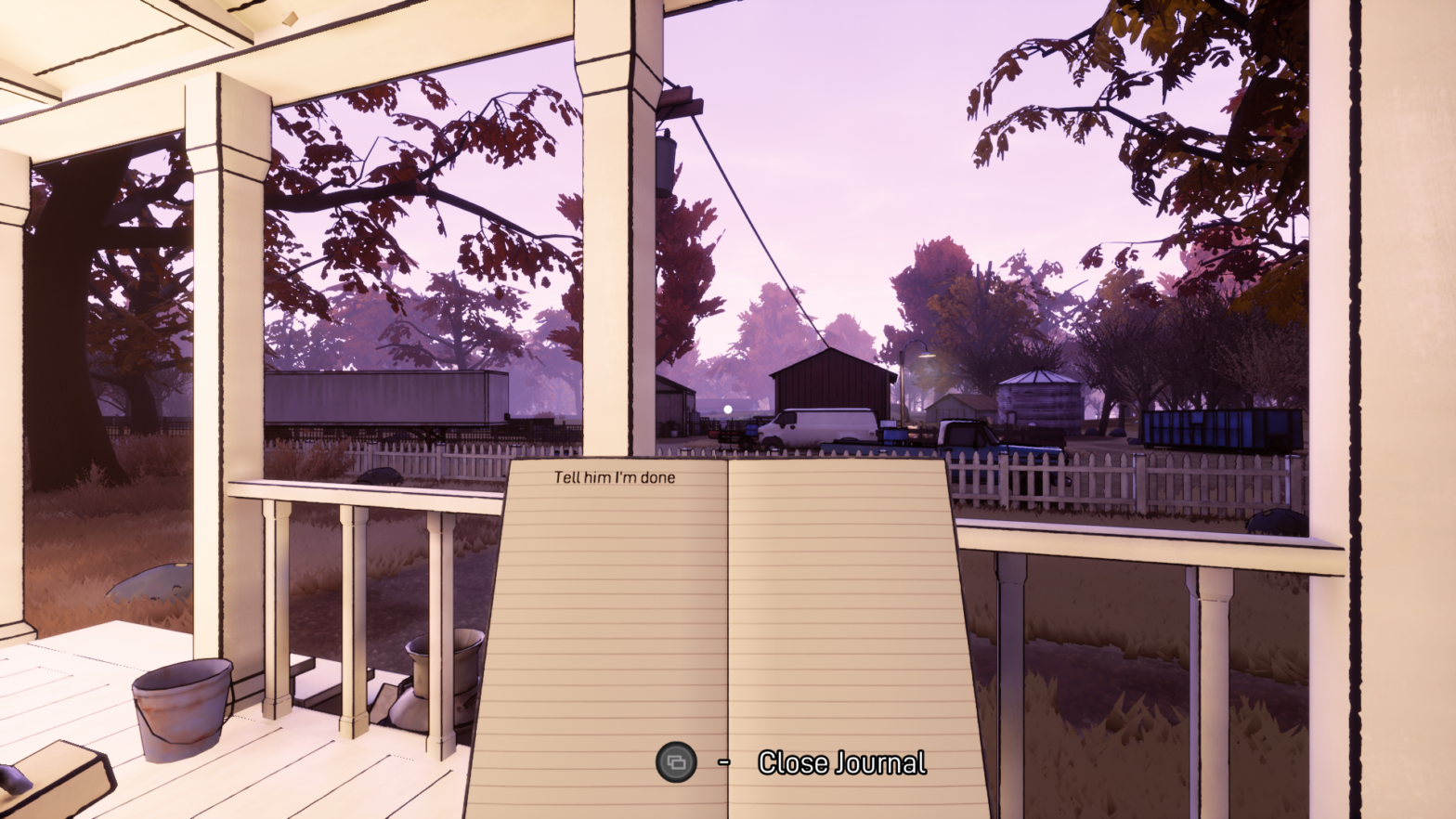The most striking thing about Mischief’s Adios (Xbox, 2021) isn’t the existentialist drama by way of shooting the shit about farming, the Vietnam War or “utility coupes.” It’s the silence of your last rites.
Spoilers ahead. Content warning for suicide.
In Adios, you play a pig farmer who helps the mob dispose of bodies. Your character has made the decision that this time will be the last time he does this – and there are lethal consequences to this choice. As we traipse around the farm, feeding and milking and shoveling, the hitman who delivers body parts to us for disposal tries to get us to change our mind.
But our mind has been made up for us: our wife, Sadie, is dead; our son, Bill, won’t talk to us; everyone else we know is either with the mob or also just dead. There’s nothing left for this veteran-turned-photojournalist-turned-pig farmer-turned-mafia cleanup crew, and so it is time to retire.
Finally, after a day of doing chores and futzing around this farm, the hitman leaves; he has (begrudgingly, we suspect) accepted the farmer’s decision, and has given the farmer the rest of the afternoon to get his affairs in order. The chores we do following this scene: catch a really big fish. Pet our horse. Call Bill.
One thing I was surprised by was the ability to simply cut the scene with Bill short. I feel on some level that this was a mistake, that I needed – our farmer needed – to have some closure with our son. But Bill said some dumb shit about it being easy to take care of someone with Alzheimer’s over our protestations that we didn’t know what to do, and that doctors watching over Sadie, quite simply, would. So I hit the button to disconnect the phone. And the conversation was over.
The silence hung in the air until I picked up the phone again to call Edith, the farmer’s neighbor.
Once finished, we only have two things left to do: retrieve the shotgun from the cellar, and cook dinner. We do this in silence too, no radio or television noise to keep us company, just the sound of water boiling and steak searing in a pan. We can make either curry, stew or steak and peas by themselves; I went with a medium-heat curry.
The game’s fine motor controls are, to put it bluntly, bad. I spent a while fumbling around for the various ingredients I needed to put in my curry, and a few more painstakingly chopping them up and adding them to the pot. To be honest, at times it felt more like Surgeon Simulator than What Remains of Edith Finch, but ultimately I managed to get everything to come together in a satisfactory way. With the curry made, I placed it at its designated spot at the table, along with my shotgun. One last quick fade to black, and then.
I’m sitting at the table, finished dinner plate in front of me. The shotgun is lying there, two shells resting on the table. Someone is talking outside. The talking eventually stops; the door opens. I hear footsteps. I expect the hitman to round the corner, sit at the table adjacent to me, make one last plea to save myself from his weapon. Instead, a gloved hand peeks around the doorframe. The pneumatic thunk of the silenced pistol fires once, cut to black, roll credits, the end.
No guitar or piano strums or plinks out a minor chord for my benefit. We return to the title screen, also silent, as the pigs who will likely eat me snuffle around in the mud.
I have played better-looking games – recently – that have tried to deal with the matter of death, and none of them come close to Adios. The music is too loud. There’s too much monologuing happening basically all the time – I’m hearing the stream of the dying character’s thoughts as it happens, oh god, oh n-
Adios got all that out of the way up front. You have an afternoon. Get your affairs in order. This is nothing but business now.
Leave the door unlocked.

Comments
One response to “‘Adios’ might have a way with words, but it’s the silence that comes through the strongest”
[…] ‘Adios’ might have a way with words, but it’s the silence that comes through the strongest –… Kaile Hultner reflects on Adios‘ quiet, understated approach to death and closure. […]